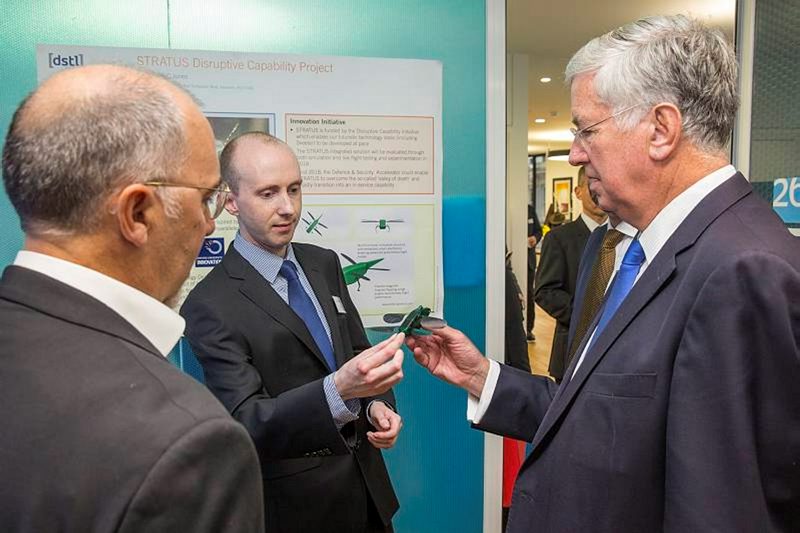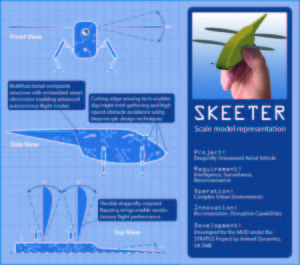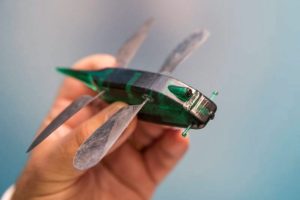
This Autumn saw Defence Secretary Michael Fallon launch the Defence Innovation Initiative, a scheme to promote home-grown innovation in the defence sector.
The £800M fund is backed by IRIS (innovation and research insights unit) and the Defence and Security Accelerator, with the fund available to new technology innovation, intending to support emerging and disruptive technologies for which the private sector does not adequately support research.
The scheme encompasses many challenges set by the MOD, in both developing technology and bringing more SMEs into the defence supply chain.
This isn’t just about money, it’s about partnerships. Our Whole Force – military, civilians and business people – working as one.”
The third in our series on industry reaction to the Defence Innovation Initiative explores the relationship between innovative companies and the MOD. Head of Content, Victoria Maggiani, spoke with Alex Caccia, co-founder and CEO of Animal Dynamics (AnDY). AnDY is one of the first companies to have been selected for the MOD’s innovation initiative and given funding to develop its dragonfly drone called Skeeter.

Can you tell us a little bit about the company – background & areas of expertise, How did it come about – what was the purpose of the company?
The Company is a spin-out from the Zoology Department at Oxford University, and was founded in early 2015. We are in the field of biophysics engineering. Our areas of expertise are in propulsion and energy efficiency inspired by nature. Natural systems have evolved interesting and unexploited strategies to achieve extraordinary performance gains – swimming, flying, and walking – and we are applying these insights using the latest materials and control systems.
Can you tell us a little about your involvement with MOD? Did you approach them? How did you find the cooperation between you?
We approached Dstl after they had an open call in 2015 for a small scale drone requiring high gust tolerance, and the development process started from there.
Were you already part of the MOD supply chain or unknown to the arena? Would you be involved with the MOD again?
We are still in the R&D stage, and as such not supplying finished product to the MOD, so it is too early to tell for us. We hope eventually to supply the MOD, and will be figuring out how to engage with the supply chain – mindful of course that the MOD will want to restrict the number of direct suppliers for practical reasons.
We asked Alex about what is needed to improve SME interaction with the MOD. He said: “I think cultural empathy is needed both from SMEs and the MOD/Dstl/CDE. The MOD by necessity needs to operate within tight constraints. They are handling taxpayers’ money, there are significant security considerations, and the groups within the MOD that could benefit from engagement with SMEs are very complex and diverse. SMEs tend to have a low capital base, work at a greater pace than the MOD is used to, and can struggle with the formality of the process. From an SME’s perspective, one risk that is often overlooked is that the company can become good at dealing with the MOD, but then fail to grow independently, which in turn means it is likely to fail to attract capital: that is a not a healthy way to scale up a business.”
What support is needed for these companies?
“I think it could be useful to have some consultants experienced in dealing with the MOD on hand to advise companies on the engagement process. More importantly, I think the MOD needs to bring in expertise and systems designed to engage with SMEs commercially, as the contracting process can be slow compared to the pace at which the technology sector is used to moving.”
Will collaboration in a notoriously information sensitive arena work?
It can work, but all parties need to be meticulous in the handling of information.

Will there be innovation just for innovation’s sake?
This is very unlikely. One of the benefits of working with the MOD is that they tend to present very clear problems that need solving. The technical approach can involve blue sky thinking, but the problems are usually easy to grasp: in our case the MOD said it needed a small drone that flies in high wind conditions. The requirements are clear; the solutions often are very challenging.
How is the funding worked out?
It is a fairly normal process, based on time and materials, with tight vigilance from Dstl on technical performance against milestones.
Are you looking to develop further?
Yes, there is a range of projects we are considering, but this is company confidential information at this stage. I can say that there are obvious other applications of such robust, low cost technologies in fields such as humanitarian work, medical devices and low energy component design.
What is your overall view of the experience and can you give any advice to other SMEs looking to work in defence?
I think SMEs need to understand that engagement with the MOD is necessarily tough. For instance, the technical review process from Dstl is thorough, and anyone engaging should know that if they are not performing technically, they will be dropped like a stone. However, the benefits are potentially significant, and if you have something to offer, the MOD will want you to succeed as a company, which is great support for any start-up. For us, the R&D journey has resulted in the development of an IP portfolio with commercially interesting non-military applications, so it is really expanding the market potential of Animal Dynamics. My own view is that having a rigorous external examiner also offers advantages to any SME, as it forces process discipline at an early stage of the company, which has knock-on benefits for a growing business.
Read Part 1 and Part 2 in the series.
Images:© Crown Copyright
If you would like to join our community and read more articles like this then please click here
Animal Dynamics Defence Innovation Initiative DII Drone Innovation Michael Fallon Skeeter technology








